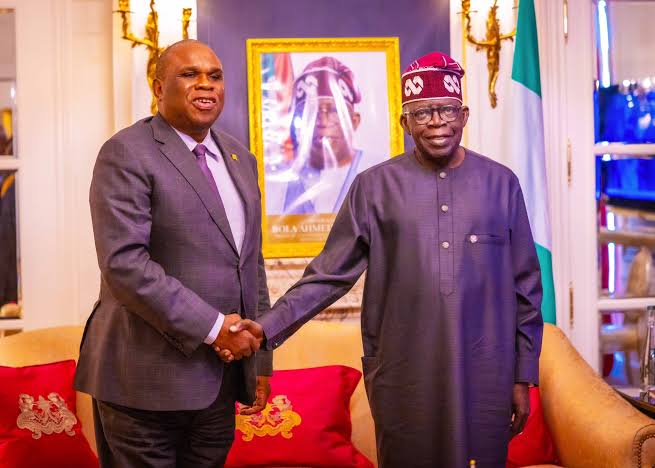
President Bola Tinubu remarked on Thursday that Nigeria was nearing a financial crisis prior to his administration’s decision to eliminate the fuel subsidy and implement crucial economic reforms.
During a meeting at the State House in Abuja with a group of former National Assembly members from the now-defunct Third Republic, Tinubu highlighted the importance of these actions for the nation’s future stability.
“For the past fifty years, Nigeria has been utilizing resources intended for future generations while also subsidizing fuel for the West African region. This made it increasingly challenging to secure a future for our children,” he stated.
Bayo Onanuga, the President’s Special Adviser on Information and Strategy, provided insights from the meeting in a statement.
Reflecting on the economic conditions at the start of his term, Tinubu recognized the significant economic and social hurdles that required immediate action.
“We faced considerable challenges upon my arrival. Nigeria would have faced bankruptcy if we had not taken prompt measures to avert economic collapse,” he noted.
He praised Nigerians for their resilience and their willingness to support the reforms, attributing the stabilization of the exchange rate and the reduction in food prices, especially during Ramadan, to their collective efforts.
“Today, we have established a strong foundation. The exchange rate is becoming more stable, food prices are falling, and there is optimism ahead,” Tinubu remarked.
The President reiterated his conviction that democracy is the most effective means for achieving economic, social, and political advancement. He acknowledged those who remain dedicated to democratic values, reflecting on how the Third Republic influenced his political path.
Senator Emmanuel Nwaka, representing the visiting delegation, expressed gratitude for the administration’s initiatives, particularly the Nigerian Education Loan Fund and the Nigerian Consumer Credit Corporation. He characterized these as transformative measures designed to alleviate financial pressures.
“I commend your initiatives in supporting students, who represent the largest demographic in the nation. Many have already reaped the benefits of these programs,” he stated.
Nwaka also pointed out the Consumer Credit Corporation (CREDICORP) as a significant advancement in combating corruption by allowing young Nigerians to obtain credit for significant purchases, such as vehicles and homes, without the need for full upfront payment.
The delegation also included Senator Bako Musa, Terwase Orbunde, Hon. Wasiu Logun, Amina Aliyu, Obi Anoliefo, and Eze Nwauwa.



